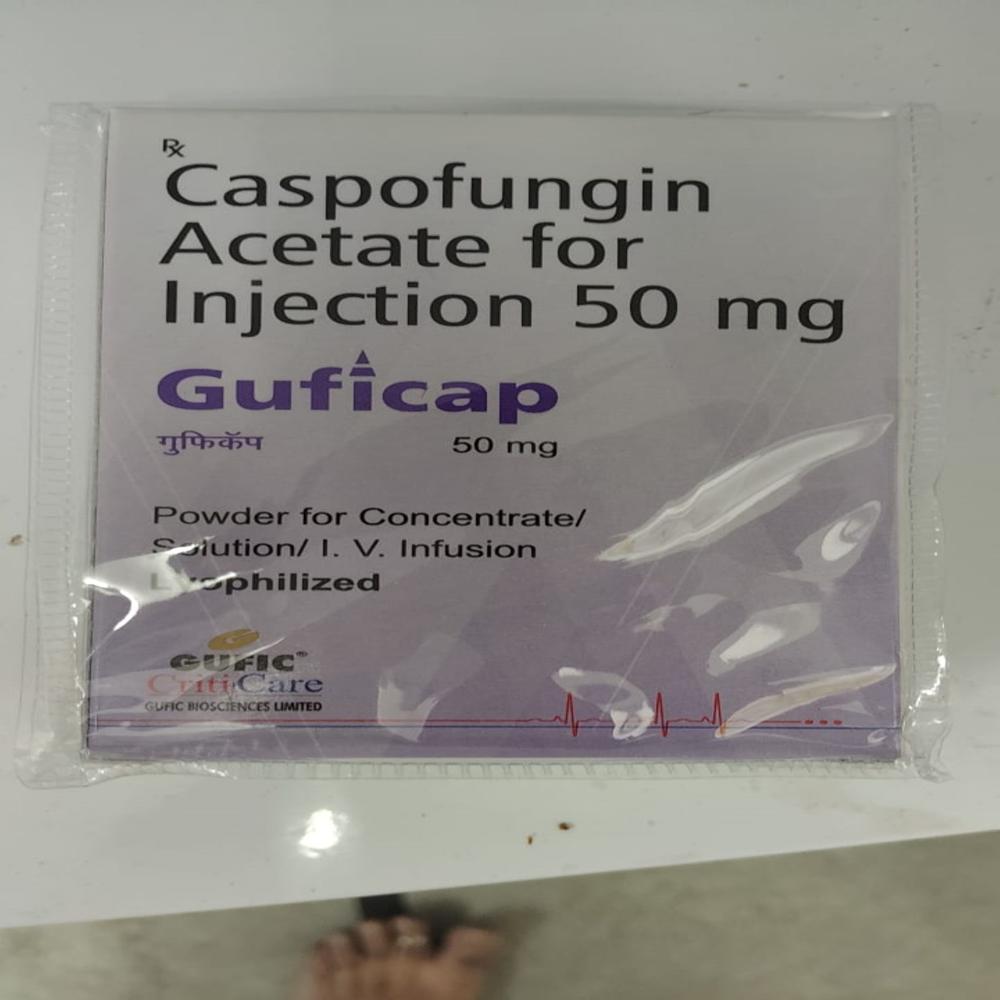Guficap (Caspofungin Acetate for Injection )
Product Details:
Guficap (Caspofungin Acetate for Injection ) Price And Quantity
- 1 Number
- 3999.0 INR/Number
Guficap (Caspofungin Acetate for Injection ) Trade Information
- Cash Advance (CA), Cash in Advance (CID)
- 1000 Number Per Week
- 2 Days
- Asia, Australia, Central America, North America, South America, Eastern Europe, Western Europe, Middle East, Africa
- All India
Product Description
Guficap contains Caspofungin Acetate, an antifungal medicine belonging to the echinocandin class. It is used for the treatment of serious fungal infections, especially when other antifungal treatments are not suitable or effective. The medication is supplied as a lyophilized powder that must be reconstituted and administered intravenously (IV) by healthcare professionals.
Caspofungin works by inhibiting the enzyme -(1,3)-D-glucan synthase, which is essential for forming the fungal cell wall. Without this protective cell wall, the fungus becomes weak and eventually dies. This mechanism makes Guficap effective against a variety of Candida and Aspergillus species.
Guficap is commonly used for the treatment of:
-
Invasive candidiasis, including candidemia (fungus in the bloodstream)
-
Intra-abdominal Candida infections
-
Esophageal candidiasis
-
Invasive aspergillosis, particularly in patients who do not respond to or cannot tolerate other therapies
-
Empirical therapy for presumed fungal infections in patients who are neutropenic (low white blood cell counts)
This medication is typically administered once daily, and dosage may vary based on the patient's age, liver function, and clinical condition. Guficap is generally well tolerated, and because it targets fungal cells specifically, it has fewer side effects compared to some older antifungal drugs.
FAQs About Guficap (Caspofungin Acetate 50 mg)
1. What is Guficap used for?
Guficap is used to treat serious fungal infections such as invasive candidiasis, intra-abdominal Candida infections, esophageal candidiasis, and invasive aspergillosis. It is also used as empirical therapy in neutropenic patients with suspected fungal infections.
2. How is Guficap given?
It is administered intravenously (IV) in a hospital or clinical setting. A healthcare professional prepares and injects the dose.
3. How does Guficap work?
Guficap blocks the production of an essential component of the fungal cell wall (-D-glucan). Without a strong cell wall, the fungus cannot survive.
4. How long does treatment usually last?
The duration varies depending on the infection and the patients response. Treatment can last anywhere from a few days to several weeks, as decided by the doctor.
5. What are the common side effects?
Possible side effects include:
-
Fever
-
Headache
-
Mild liver enzyme elevation
-
Redness or irritation at the injection site
-
Nausea
Most side effects are mild and temporary.
6. Can Guficap be used in children?
Yes, Caspofungin can be used in pediatric patients, but the dose must be adjusted based on weight and medical condition.
7. Is Guficap safe for people with liver problems?
It can be used, but the dose may need to be adjusted. The doctor will monitor liver function tests during treatment.
8. Can Guficap interact with other medications?
Yes. Certain medicines (e.g., cyclosporine, rifampin, some antivirals) may increase or decrease its levels. Always inform your doctor about any medications you are taking.
9. Is it safe during pregnancy or breastfeeding?
It should be used during pregnancy only if clearly needed. Breastfeeding safety is not well established. Always consult a doctor before use.
10. What should I do if I miss a dose?
Because it is given in a medical facility, missed doses are uncommon. The healthcare team will adjust the schedule if needed.

Price:
- 50
- 100
- 200
- 250
- 500
- 1000+




 Contact Us
Contact Us Call Me Free
Call Me Free
